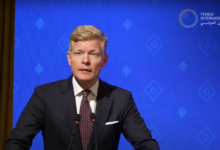OCHA Daily Noon Briefing Highlights: Anticipatory Action – Afghanistan – Yemen

Daily Noon Briefing Highlights
SMA NEWS – NEW YORK
12 October 2021
Anticipatory Action
The European Union, together with the United Nations, on Tuesday, convened a virtual high-level event on anticipatory action against food crises.
The European Commissioner for Crisis Management was joined by the Executive Director of the World Food Programme, David Beasley; the Director-General of the Food and Agriculture Organization, Qu Dongyu; and the Under-Secretary-General for Humanitarian Affairs and Emergency Relief Coordinator, Martin Griffiths.
There was consensus on the sharp risk in food insecurity and the need to leverage anticipatory action even further as an effective approach for utilizing scarce resources.
In his remarks, Mr. Griffiths reflected on the success of using anticipatory action based on forecasts of imminent famines, such as in Ethiopia and Somalia. He also promoted the need to invest in building local-level early warning, financing tools and the conviction to act early.
Afghanistan
OCHA reports that yesterday, 11 October, the UN Refugee Agency provided core relief items including essential household items to more than 4,000 internally displaced people and people affected by conflict.
Last week, the International Organization for Migration distributed relief items and shelter kits to more than 9,700 vulnerable Afghans in Ghazni, Kunduz and Parwan provinces.
The UN Population Fund has established four static emergency clinics along border areas of Afghanistan to provide reproductive health and protection services to returnees, internally displaced people and host communities. The agency is also supporting a basic health clinic for internally displaced people in Karokh District in Herat Province.
The Food and Agriculture Organization is providing emergency assistance in the form of seeds to farmers in Afghanistan. The project will benefit more than 61,000 people affected by drought and insecurity.
The Flash Appeal for Afghanistan, which requires US$606.3 million to support 11 million people with humanitarian aid through the end of 2021, is currently 38 per cent funded.
Yemen
The UN Resident and Humanitarian Coordinator for Yemen, David Gressly, said yesterday in a briefing to the media in Geneva that 20 million people in the country, or two thirds of the population, need humanitarian assistance, with 5 million people just a step away from famine and about 400,000 children at imminent risk of death from malnutrition.
Mr. Gressly said that generous donor funding after March allowed humanitarians to scale up food and nutrition support, staving off famine. But he said that the situation remains extremely fragile and that programmes for health, water, livelihoods, and support to internally displaced persons are all severely underfunded, at less than 20 per cent.
He is particularly concerned by the escalation in fighting in and around Marib, which is forcing people to flee their homes in an area that already has 1 million displaced people.
Mr. Gressly said that he has travelled extensively by road in the north and south over the past six months and seen signs everywhere of destruction and a collapsed economy, which is a major driver of the humanitarian crisis.
He said that in addition to sustained humanitarian funding, Yemen needs help to unlock parts of the economy even in the context of conflict, but that without an end to the conflict and political settlement, there will be massive humanitarian needs in Yemen.
“I hope that we can find a way forward to allow Yemenis to rebuild their economy and their lives and to avoid the situation I have seen in so many countries I have worked in, where a conflict goes on for 20, 25 years. When that happens, you have a totally transformed country,” he said.
The Humanitarian Response Plan for Yemen has received US$2.1 billion, or 55 per cent, of the requirements.







